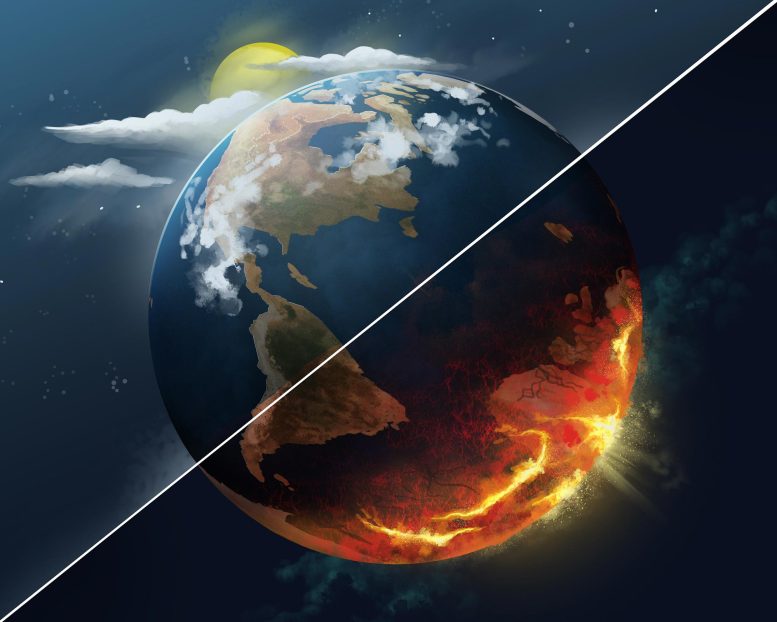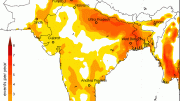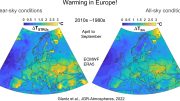
Researchers from Chalmers University of Technology and Lund University, Sweden, argue that the world is heading towards a temperature increase of 2.5–3 degrees Celsius, beyond the 2-degree target of the Paris Agreement, due to the slow phasing out of coal power. The study indicates that global warming can still be limited to 2 degrees if countries, especially major coal users like China and India, expedite the coal phase-out process, but the researchers’ realistic scenarios suggest this is unlikely due to insufficient commitments from countries and geopolitical conflicts.
The goal of limiting global warming to a maximum of 2 degrees as set by the Paris Agreement seems unlikely to be achieved, with current trends indicating a potential temperature rise of 2.5–3 degrees. Nonetheless, it’s still possible to avoid this elevated warming. Evidence for this has been demonstrated in a recent study by scientists from Chalmers University of Technology and Lund University in Sweden.

Aleh Cherp, Professor at the International Institute for Industrial Environmental Economics, Lund University. Credit: Central European University.
“More and more countries are promising that they will phase out coal from their energy systems, which is positive. But unfortunately, their commitments are not strong enough. If we are to have a realistic chance of meeting the 2-degree target, the phasing out of coal needs to happen faster,” says Aleh Cherp, professor at the International Institute for Industrial Environmental Economics at Lund University.
China and India need to begin phasing out their coal use
Phasing out coal is necessary to keep the world’s temperature increase below 2 degrees, compared to pre-industrial levels. In a study by the research program Mistra Electrification, a group of researchers analyzed 72 countries’ pledged commitments to phase out their coal use by 2022–2050.
In the best-case scenario, the researchers show that it is possible that the temperature increase will stay at 2 degrees. But that assumes, among other things, that both China and India begin phasing out their coal use within five years. Furthermore, their phase-out needs to be as rapid as it has been in the UK, which is the fastest that ever happened in a large country, and faster than Germany has promised. This may create inequities that will need to be addressed by international policies.

Jessica Jewell, Associate Professor at the Division of Physical Resource theory, Chalmers University of Technology. Credit: Chalmers
Global warming of up to 3 degrees is likely
The research group has also developed scenarios that they consider to be the most realistic. These scenarios indicate that Earth is moving towards a global warming of 2.5–3 degrees.
“The countries’ commitments are not sufficient, not even among the most ambitious countries. In addition, Russia’s invasion of Ukraine may prevent some countries from phasing out coal as they promised,” says Jessica Jewell, Associate Professor at the Division of Physical Resource Theory at Chalmers University of Technology.
The study shows that the 72 countries’ commitments to phase out coal power are similar to each other and in line with historical data for how quickly coal power was phased out in the past.
Reference: “Phasing out coal for 2 °C target requires worldwide replication of most ambitious national plans despite security and fairness concerns” by Vadim Vinichenko, Marta Vetier, Jessica Jewell, Lola Nacke and Aleh Cherp, 11 January 2023, Environmental Research Letters.
DOI: 10.1088/1748-9326/acadf6









“If we are to have a realistic chance of meeting the 2-degree target, the phasing out of coal needs to happen faster,…”
For that to happen, there needs to be alternatives to simply resigning to a lifestyle similar to what Victorians accepted for lack of choices. That means replacing fossil fuel power plants with modern nuclear fission reactors, and investing more money in solving the problems nuclear fusion.
I read the study. This is a political paper only. The article says “…current trends indicating a potential temperature rise of 2.5–3 degrees…Evidence for this has been demonstrated in a recent study by scientists”, but it was not. The study only analyzes carbon emissions pledges, presenting no evidence, and claims a temperature rise based on “empirically-grounded assumptions” by simply citing the IPCC climate model. The IPCC climate model is basically an evidence-free computer projection.
A rapid 3 degree temperature increase is unlikely, but it would put us at Pliocene temperatures. The photo used shows the earth on fire in some kind of molten vulcanism? The pliocene was an explosion of life, with expansive forests that are now marginal grasslands. To use a coal-industry propaganda term, it would be “global greening”, not a firey hellscape. We’re trying to avoid the disruption of changes to climate, not avoid a hothouse partially-molten Earth, which would be like the Hadean epoch requiring hundreds of degrees of temperature increase.
The study gets one thing right, “This also requires much stronger effort from India and China than from OECD countries”, which is an understatement. Unfortunately, it’s up to them, or up to the rest of the world to sell them the energy they need without carbon emissions.
Can you explain why you are not proud enough to put your name on your assessment?
This is a internet website comment section. I’m curious how you’d plan to use that information. Please proudly put your photo ID with credit details in your replies so we can discuss what pride goeth before.
I always use my real, full name. However, I think that is less important than the facts and logic presented in the comment.
Someone who goes by the handle of “John” basically agrees with you. Why did you not make a similar complaint to him? I suspect that you complained to “Hottan Bothred” because that was the best defense you could muster.
“A rapid 3 degree temperature increase is unlikely”. Not so. Already well underway. Well documented too. No, it hasn’t happened yet, just like your “evidence-free computer projection” claim (how can their be “evidence” of higher temperatures then currently being measured?), that’s why reliance on models is required. You can’t measure what hasn’t happened yet – but you sure as s*** can make a projection based on past measurements. Which is why the 3 degree temperature increase is almost certain. Everything else is based upon the endless assumptions that mitigation will be finally adopted on a global scale (hasn’t happened) and EVERY nation will meet their supposed targets (hasn’t happened). All we have are projections, but based upon current and past projections – we’re going to blow right past the so-called “limits” being promoted.
You’re right, there can’t be evidence other than what is measured, unless measured experimentally, which is very hard to do with climate. I quoted the article’s claim that the study has evidence, and you’re right, it does not, and cannot without measurements. I’m afraid you’re agreeing with me there.
+3c may happen but seems unlikely to me in the short-to-medium term. It could be almost certain in the extreme long term, thousands of years. It’s hard to tell what time-frame the article claims, but it does mention “within 5 years”. I see a great deal of absolute certainty lately, that the Earth will be uninhabitable in 6 years, apocalyptic rhetoric. I’m injecting a little scientific skepticism, pointing out problems which could be corrected to make a better argument. The article claimed it was evidence, and as you said, how can there be? With such a fundamental error in the third sentence, they should double-check their work.
There has been a nearly linear rise in sea level for about the last 7,000 years. Based on that, it is probably reasonable to do a linear extrapolation of our recent instrumental temperature measurements. There has been a rise of about 1.5 deg C in the last 170 years. Therefore, we can probably expect about another 3 deg C in about 350 years — assuming that we do nothing about so-called ‘green house’ gases and technology does not advance. Considering how much technology has advanced in the last century, I don’t think that betting on technology stagnating would be a prudent bet. While progress on solving the problems of controlled thermonuclear fusion has been slow, one should consider that the first 30 years was without benefit of easy access to computers, and lasers were not invented until two years after Project Sherwood was concluded in 1958.
I think it unlikely that we won’t solve the problem of controlled fusion in much less than 100 years. Companies such as Lockheed-Martin (Skunk Works), and no less than Microsoft, are looking at time frames of a decade or two. When that happens, CO2 will be a non-issue, whether or not it plays as large a role as alarmists claim.
The ipcc model is far from evidence free unless you want to say projections of the behavior of a falling body based on laws of physics is evidence free. But if your criteria for evidence is only going to be satisfied by some actual time travel to the future to take measurements then good luck.
I would want to say that. Projections of the behavior of a falling body won’t generate new evidence, but they’re based on what the study called “empirically-grounded assumptions”; we’ve done the tests, and seen how well falling bodies are behaved. You gave a great example, because we know what they do, making projection data useful. The IPCC didn’t have a spare world in a laboratory to run empirical tests on. With vague uncertain incomplete new input data about system of chaos spanning the whole globe, a climate model can output whatever result you want. I’m still onboard with dumping gigatons of insulating chemicals into the atmosphere having an initial greenhouse effect, meddling at a global scale. Climate models are interesting, but still, it’s not an evidence-generating exercise. Their panicked certainty, about a system no human alive could possibly understand, with the melting fireball Earth ejecting magma into space, it’s must have raised your scientific skepticism a little?
Even though claims are frequently made that General Circulation Models are based on first principles physics, that is hyperbole. There are no computers capable of handling the problems of energy exchange in clouds at the spatial resolution which the processes occur. Therefore, cloud behavior is parameterized. That is a fancy way of saying that the experts make a best guess on the gross behavior of clouds, and use a simplified, low order function to describe how they think things work — that is, it is subjective. Not unlike saying that E = mC^2 +/-epsilon, where epsilon is an unknown uncertainty.
Why would China close 5 year old coal plants? In 2022 50GW of coal power capacity added (constr.) and 4.1GW closed.